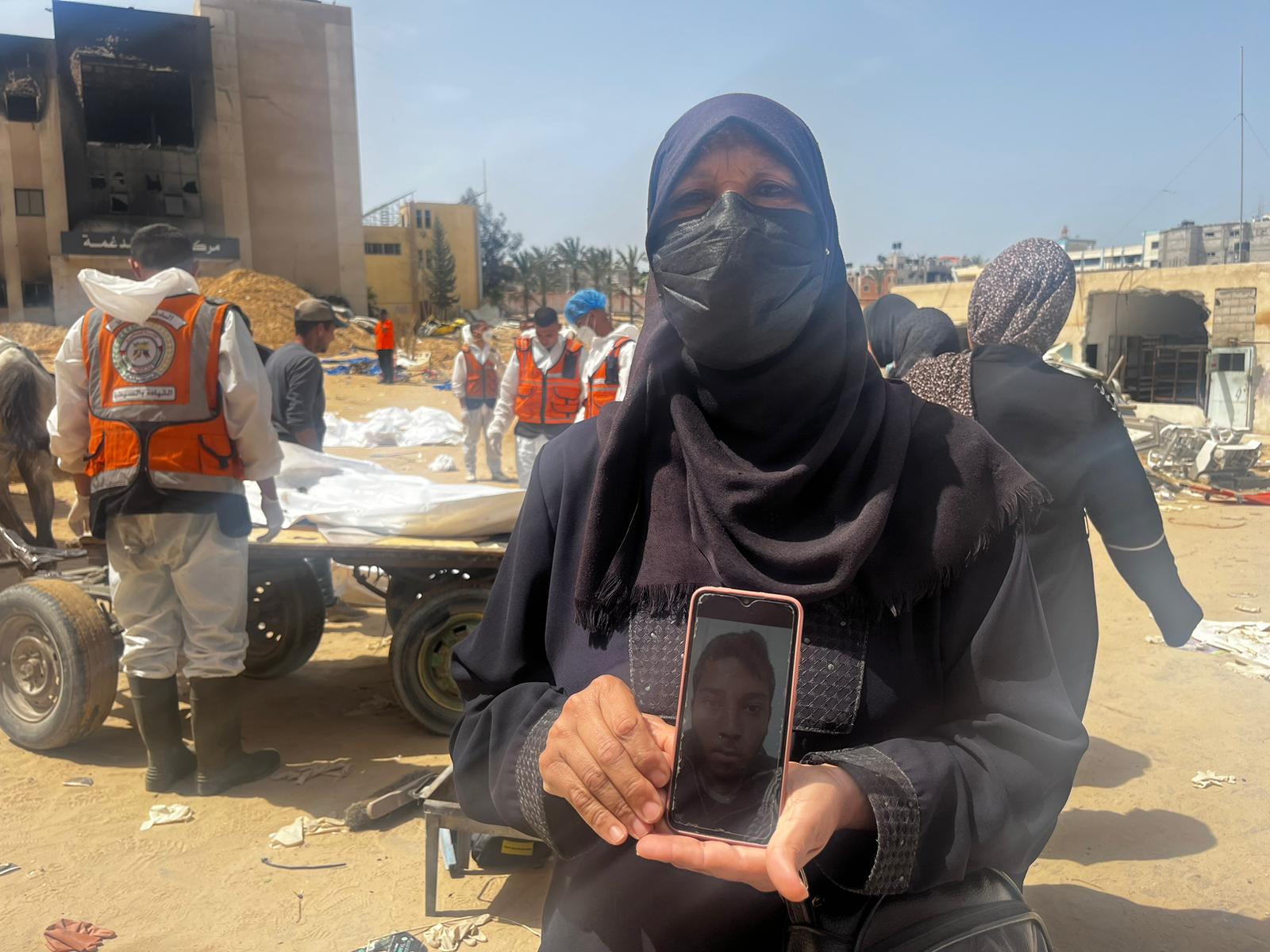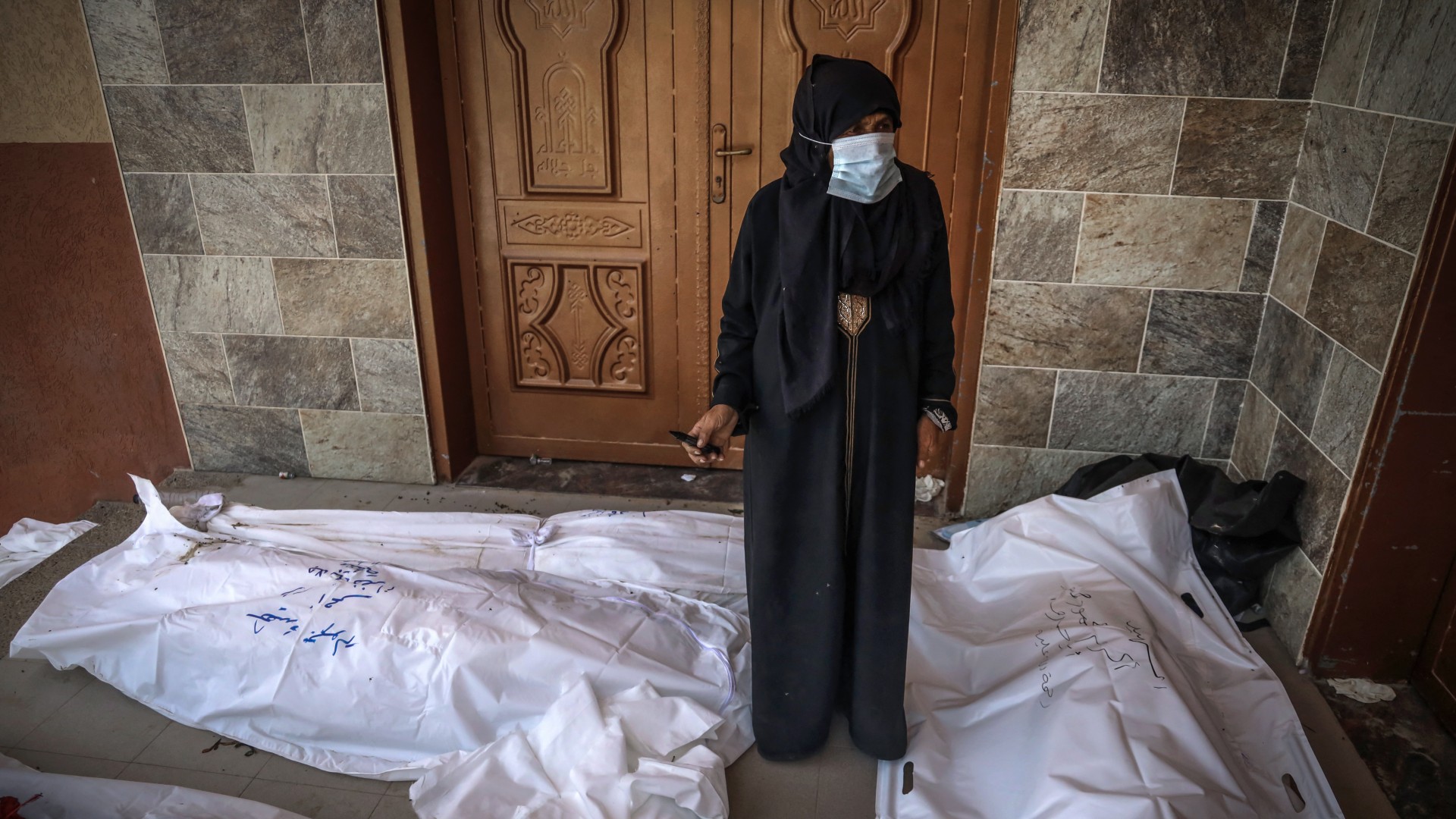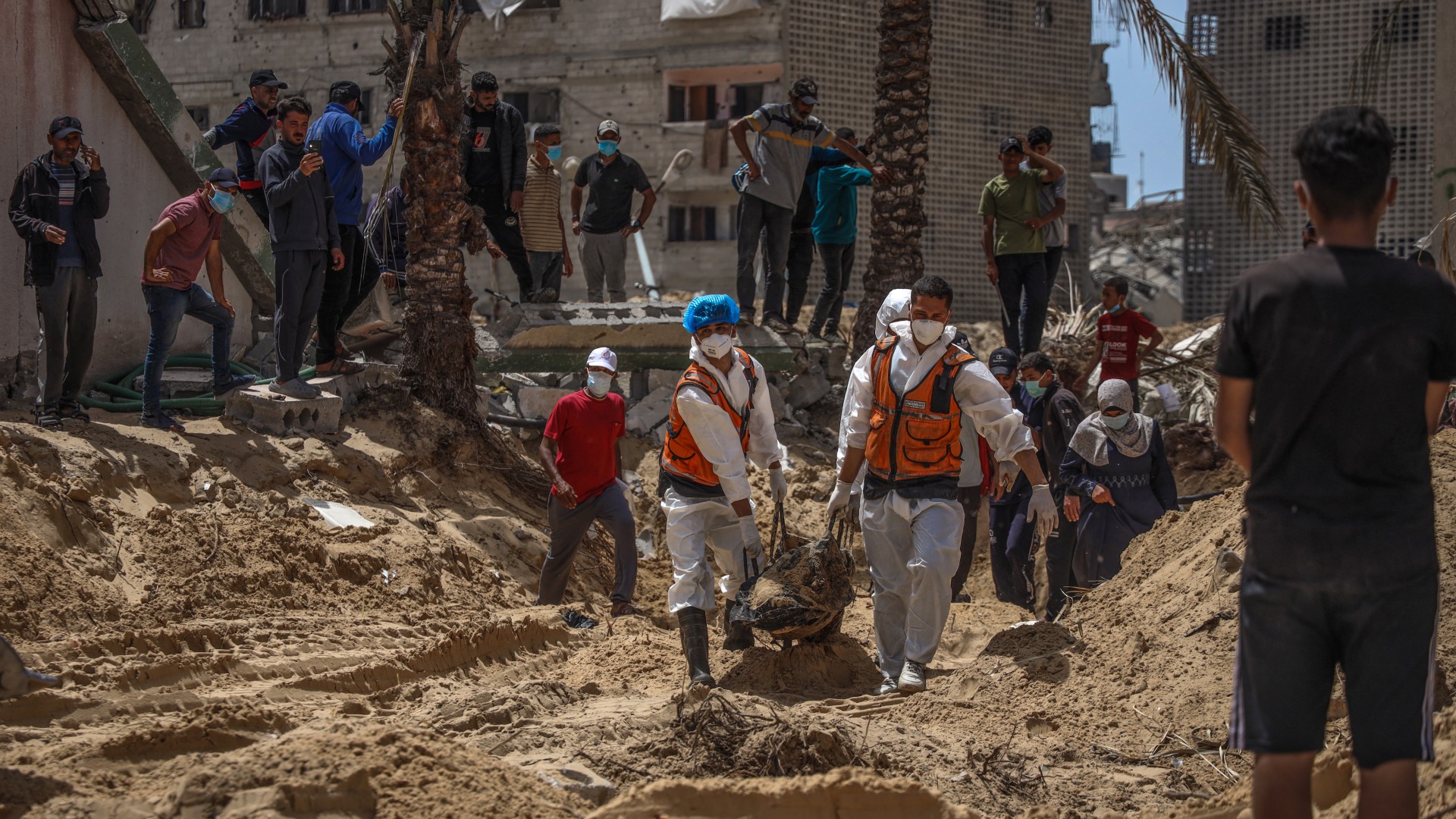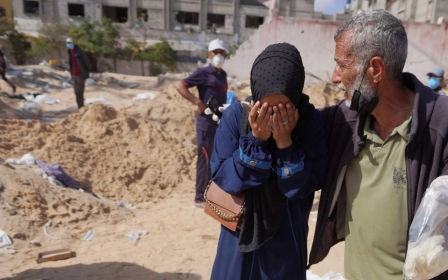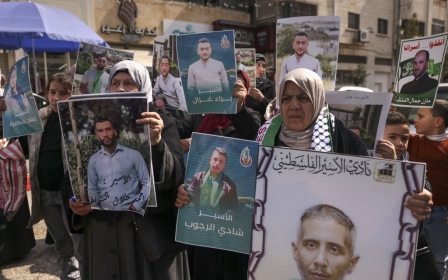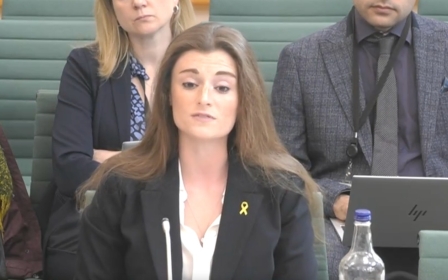Nasser hospital mass graves: Pain and patience in Gaza as bodies are exhumed
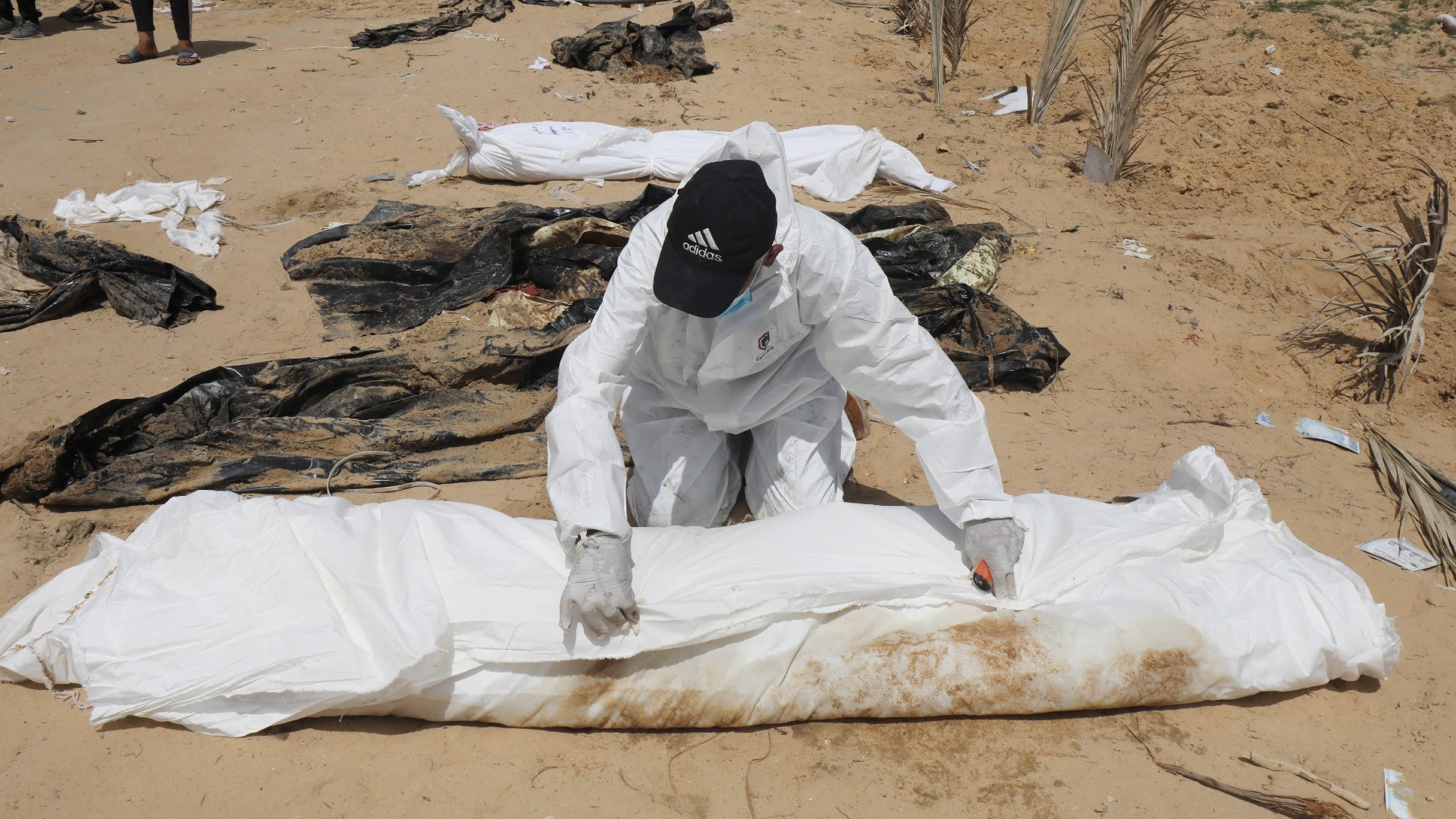
For the past four mornings, Amal al-Baiouk has come to Nasser hospital to watch the dead bodies be brought out.
Like the other parents of missing people, who keep returning to this devastated corner of Khan Younis, disappointment is etched across her face.
Rescue workers begin exhuming early, with dozens pulled out of the ground as the day goes on.
For Palestinian mothers waiting patiently around the burial pits, any news of their sons is good news, even if that means they are dead. Some have been missing for three months.
“I look at each body’s face, but I have not been guided to my son,” Baiouk tells Middle East Eye.
New MEE newsletter: Jerusalem Dispatch
Sign up to get the latest insights and analysis on Israel-Palestine, alongside Turkey Unpacked and other MEE newsletters
It can be difficult to distinguish the corpses’ features. Bodies can be badly decomposed or have been mutilated in some way.
“If my son’s face is not visible, I will recognise him through his teeth,” says Baiouk. “He has a tooth that rises above the rest, and I can find him that way.”
All around these mass graves is destruction. Nasser hospital’s surviving buildings are hollow shells, and the surrounding area has simply been erased.
Israeli forces began their assault on Khan Younis in January, with attacks sending Palestinian residents fleeing. Around 10,000 people took shelter in the southern Gaza town’s hospital, alongside 450 patients and 300 staff.
The hospital itself repeatedly came under attack. In February, Israeli troops staged an offensive on the facility, and remained there until pulling out of Khan Younis altogether earlier this month.
That’s when returning Palestinians discovered suspicious piles of sand and earth outside the hospital’s ruins.
Yamen Abu Suleiman, head of the civil defence search-and-rescue team in Khan Younis, said three burial pits have been found.
The first two were originally dug by hospital staff in the perimeter within the hospital compound’s walls while under Israeli siege, as they were unable to safely take cadavers to cemeteries. On 27 January, health officials said they had buried 150 people in the hospital grounds.
A third burial pit appears to have been dug when Israel occupied the site.
The Israeli military denies it dug any graves, saying it “respectfully” exhumed bodies while searching for some of the 133 captives taken during the 7 October Hamas-led attack on Israel.
According to Abu Suleiman, however, they not only roughly exhumed the graves but dug a new pit in which they dumped many more bodies, “including people they killed inside the hospital”.
When rescue workers began clearing the piles of sand around the hospital, they never expected to find limbs emerging as they worked.
Men, women and children were among the dead. Some, according to rescue workers and the UN human rights office, had their hands tied behind their backs.
The civil defence says there are bodies wearing the uniforms Israel uses for detainees. People appear to have been shot in the head, it says.
“They have brought out 330 bodies so far from a single burial site,” Abu Suleiman tells MEE. “There are still two more to check.”
'It’s like fire. I want closure'
In six months of war, Israel has killed 34,000 Palestinians. Many thousands more are missing - some hidden beneath the rubble of bombed buildings, some vanished without a trace.
Baiouk’s son, Medhat Suleiman Aata, is one of those who simply disappeared.
The family are from Khan Younis but were sheltering in Rafah, like 1.5 million other Palestinians from across the Gaza Strip, when Medhat went for a walk on 2 February.
“He went out even though it was night and there was a lot of bombings nearby, and it was terrifying. He never came back,” Baiouk recalls.
Desperate for news, Medhat’s family placed photos of him on the windscreens of cars on Rafah’s streets.
“Someone saw his photo and told us he had seen him at the hospital as the Israelis surrounded it. I don’t know if he had been injured and brought there or what,” says Baiouk.
The witness told Baiouk that the Israelis had ordered everyone to leave the hospital. When Medhat reached the entrance, soldiers demanded he show them his ID.
“He said my son didn’t have it, so they shot him three times in the chest,” Baiouk says.
“I don’t know how reliable the story is, but I keep looking for him. May no one have to go through what we’ve been going through,” she adds.
“It’s like fire. I want closure. If I find him and he’s a martyr, it is not a loss, he is with our god. But if I never find him, my heart will always ache and I will keep looking for him for my entire life.”
'The situation is really dire'
Most people gathered in Nasser hospital are wearing masks. They don’t do much to hide the smell of rotting flesh, but it helps a little.
Every now and again, Palestinians waiting to check the bodies have to step away and take a break from the stench of death.
It’s easier to talk that way, so Tahani Abu Rizek prefers to tell her story outside the hospital walls.
“As you can see, the situation here at Nasser is really dire,” Abu Rizek, 45, tells MEE.
On 23 January, Abu Rizek’s brother, Ahmed, and other members of her family sat at a cafe on the beach in al-Mawasi, a town a handful of kilometres east of Khan Younis. Two missiles struck, killing Ahmed and two of his cousins.
Abu Rizek was told Ahmed was taken to Nasser hospital along with people wounded in the attack and buried in the grounds.
“We don’t know what is left of him. Was he burnt to death? Is there still even a skeleton?” she asks.
“We just want to find anything that belongs to him, even just a small piece of clothing, so we can feel like we found him,” Abu Rizek says.
“May god help his kids, they’ve been crying for three months.”
Middle East Eye delivers independent and unrivalled coverage and analysis of the Middle East, North Africa and beyond. To learn more about republishing this content and the associated fees, please fill out this form. More about MEE can be found here.


